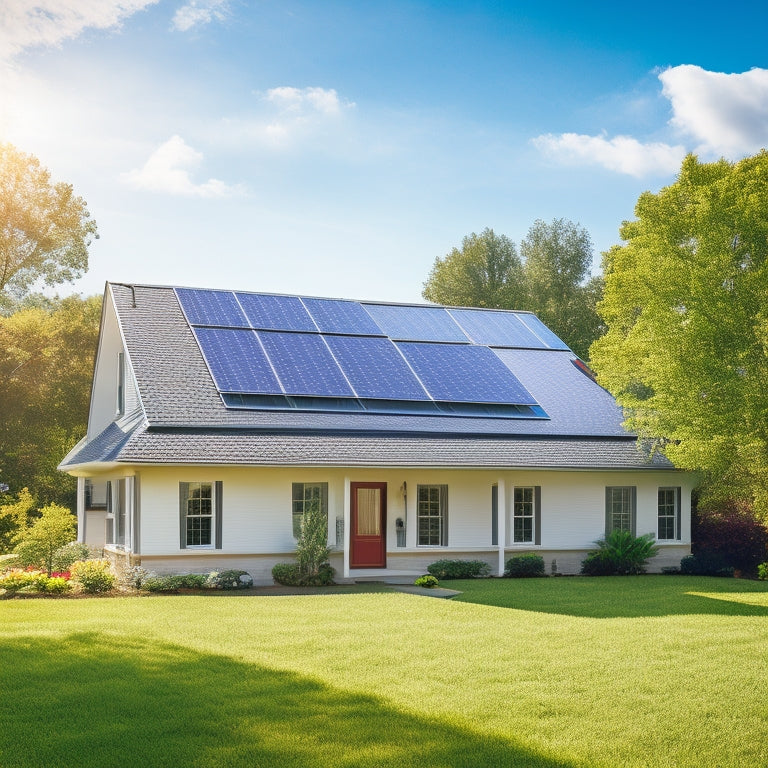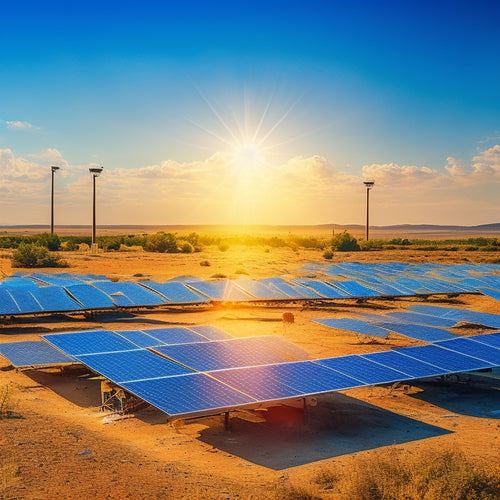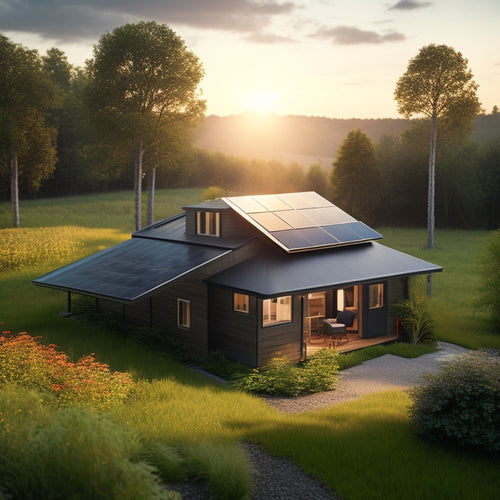
Why Install Your Own Home Panels System
Share
By installing your own home panels system, you'll experience personal satisfaction from completing a complex project, gain hands-on knowledge for troubleshooting and maintenance, and develop useful installation tips. You'll save money in the long run through reduced utility bills, with average annual savings ranging from $400 to $1,000. Additionally, you'll increase your energy independence, contribute to a sustainable lifestyle, and enhance your property value. Moreover, you'll reduce your reliance on fossil fuels, minimizing your carbon footprint. As you investigate the world of solar energy, you'll uncover more benefits, from improved energy efficiency to warranty and technical support options that will help you optimize your system's performance.
Key Takeaways
- Installing your own home panels system provides personal satisfaction, hands-on knowledge, and development of useful installation tips for future projects.
- A successful DIY installation leads to significant cost savings over time, with average annual savings ranging from $400 to $1,000.
- By generating personal electricity, you'll reduce your reliance on the grid, increase energy independence, and contribute to sustainable living.
- A home panels system can increase your property value, making it a wise financial decision, with higher market demand and government incentives.
- With proper maintenance and performance checks, you can ensure optimal energy absorption, reduce wear and tear, and address any discrepancies in output promptly.
Benefits of DIY Installation
When you take on a DIY home panels system installation, you'll reap numerous benefits that can enhance your overall experience. One significant advantage is the sense of personal satisfaction that comes with completing a complex project on your own.
You'll also gain hands-on knowledge of your system, allowing you to troubleshoot and maintain it more effectively. Additionally, you'll develop useful installation tips and techniques that can be applied to future projects.
Moreover, considering key considerations for DIY solar systems and choosing high-efficiency panels, durable mounting systems, and reliable inverters can guarantee a successful installation.
Cost Savings Over Time
You've made a significant investment in your DIY home panels system, and now it's time to reap the rewards. Your initial investment will pay off over time through substantial cost savings. As you generate your own electricity, you'll reduce your reliance on the grid and lower your utility bills.
The amount you save will depend on your energy usage and the size of your system. With the integration of solar energy, you can decrease reliance on fossil fuels and enhance energy efficiency, leading to even more savings.
On average, homeowners can save between $400 and $1,000 per year. Over the system's lifespan, these long-term savings can add up to tens of thousands of dollars.
With a typical system lasting 25 years or more, the cost savings will far outweigh the initial investment, making your DIY home panels system a wise financial decision.
Energy Independence Today
You can power your own home with a home panels system, reducing your reliance on the grid and the uncertainty that comes with it.
By producing your own energy, you'll break free from the constraints of traditional energy sources and gain control over your energy usage.
With energy independence, you'll experience the freedom and security that comes with generating your own power.
Power Your Own Home
Taking control of your energy consumption is an essential step towards achieving energy independence, and installing a home panels system is a substantial move in this direction.
By utilizing solar energy, you can power your own home efficiently, reducing your reliance on the grid. Here's a breakdown of the benefits:
| Energy Source | Home Efficiency | Benefits |
| Solar Energy | High | Renewable, Zero Emissions |
| Grid Power | Low | Convenient, but Unreliable |
| Fossil Fuels | Low | High Emissions, Expensive |
| Wind Power | Medium | Intermittent, Noise Pollution |
| Geothermal | High | Location Dependent, High Upfront Costs |
With a home panels system, you can enjoy the benefits of solar energy while increasing your home efficiency.
Reduce Energy Reliance
How much of your hard-earned money is spent on energy bills each month? By installing your own home panels system, you can greatly reduce your energy reliance on the grid.
This means you'll be less dependent on external energy sources, which can be unpredictable and expensive. With a home panels system, you can generate your own clean energy and reduce your energy bills.
This is especially important for those who value energy efficiency and want to investigate grid alternatives. By utilizing renewable energy, you'll not only save money but also contribute to a more sustainable future.
Break Free Now
Energy independence is within reach with a home panels system, enabling homeowners like you to sever ties with the grid.
With solar technology advancing and system efficiency increasing, you can generate your own home energy and reduce your reliance on the grid.
Here are 4 key benefits to achieving energy independence:
-
Financial freedom: Break free from rising electricity costs and enjoy predictable energy expenses.
-
Energy autonomy: Generate your own clean energy and reduce your carbon footprint.
-
Increased property value: A home panels system can increase your property value and appeal to potential buyers.
- Future-proofing: Stay ahead of future trends and regulations, which are likely to incentivize renewable energy adoption.
Reduce Carbon Footprint Now
As the world grapples with the pressing issue of climate change, your decision to adopt a home panels system takes on a sense of urgency, and reducing your carbon footprint now becomes an essential step towards a sustainable future.
By installing solar panels, you're making an eco-friendly choice that greatly minimizes your reliance on fossil fuels. This, in turn, reduces the amount of greenhouse gases emitted into the atmosphere, contributing to a cleaner environment.
For instance, incorporating solar-powered corner units into your kitchen design can enable energy harvesting and reduce grid reliance.
By going solar, you're not only reducing your carbon footprint but also embracing sustainable living.
With a home panels system, you're taking a proactive approach to mitigate the impacts of climate change, ensuring a healthier planet for future generations.
Increase Property Value Fast
By opting for a home panels system, you're not only reducing your carbon footprint but also making a savvy investment in your property.
Installing solar panels can greatly increase your property value, making it more attractive to potential buyers if you decide to sell in the future.
Here are four ways a home panels system can enhance your property's value:
-
Increased property appraisal: A home panels system can increase your property's appraisal value, resulting in higher selling prices.
-
Higher market demand: Properties with solar panels are in high demand, attracting buyers who value energy efficiency and sustainability.
-
Reduced energy costs: Solar panels can greatly reduce energy bills, making your property more attractive to cost-conscious buyers.
- Government incentives: Many governments offer incentives for properties with solar panels, increasing their appeal to buyers and enhancing their value.
Easy Maintenance Tips
You'll want to make cleaning panel surfaces a regular habit to guarantee optimal energy absorption.
Additionally, scheduling regular system checks will help identify potential issues before they become major problems.
Clean Panel Surfaces
Cleaning your home panels regularly is vital to maintaining their efficiency and longevity, since dirt and debris can greatly reduce their performance.
When it comes to panel cleaning, you want to guarantee you're doing it right. Here's what you need to do:
-
Hose down the panels: Use a garden hose to remove loose dirt and debris.
-
Mild soap and water: Mix a mild soap with warm water, and use a soft-bristled brush to gently scrub the panels.
-
Rinse thoroughly: Remove any soap residue with clean water to prevent streaks.
- Inspect and repeat: Inspect the panels for remaining dirt and debris, and repeat the process as needed.
Regular System Checks
Every few months, take a closer look at your home panels system to confirm it's running smoothly and efficiently. This regular check-up guarantees peak system performance and identifies potential issues before they become major problems.
Perform safety inspections to detect signs of wear and tear, corrosion, or damage to cables and connectors. Check the system's electrical output to verify it's meeting your energy needs. Verify that the inverters are functioning correctly and that the monitoring system is accurately tracking your energy production.
Warranty and Support Matters
With your investment in a home panels system, warranty and support matters take center stage as you expect reliable performance and minimal downtime.
You want to guarantee that your system operates smoothly and efficiently, and that any issues are addressed promptly.
When evaluating a home panels system, consider the following warranty and support aspects:
-
Warranty coverage: Understand the duration and scope of the warranty, including what's covered and what's not.
-
Technical support: Look for 24/7 technical support, including online resources, phone support, and on-site assistance.
-
Installation guidelines and troubleshooting tips: Verify that the manufacturer provides clear installation guidelines and troubleshooting tips to minimize errors and downtime.
- Claim process and customer service: Evaluate the claim process and customer service reputation to guarantee that any issues are resolved quickly and efficiently.
Frequently Asked Questions
Can I Install Solar Panels on My Rented Property?
You'll need landlord approval to install solar panels on your rented property, which may involve negotiating installation costs and ensuring the system's removal when your lease ends; research local regulations and weigh the benefits against potential obstacles.
How Do I Choose the Right Solar Panel System Size?
You'll want to evaluate your energy needs, roof size, and local solar irradiance to choose the right solar panel system size, balancing solar panel efficiency with system installation costs to optimize your return on investment.
What Happens to Excess Energy Generated by My Panels?
You generate more power than you need, you feed it back into the grid, and you benefit from net metering, earning energy credits that offset your utility bills, or you store excess energy in batteries for later use.
Are DIY Solar Panel Systems Compatible With Grid Tie?
You'll find that most DIY solar panel systems are compatible with grid tie, allowing you to sell excess energy back to the grid, as long as you choose an inverter that meets grid tie standards and follows local utility regulations.
Do Solar Panels Work During Power Outages or at Night?
As you utilize the power of sunlight, you wonder if your solar panels will keep the lights on during outages or nighttime; unfortunately, they won't, but with energy storage solutions, you can optimize solar panel efficiency and store excess energy for later use.
Related Posts
-

What Happens Without a Charge Controller in Solar Panels
Without a charge controller in your solar panel system, you risk overheating batteries due to overcharging, which can...
-

Diy Off Grid Solar
By embracing DIY off-grid solar, you can break free from grid dependence, slashing your energy bills by up to 90% and...
-

Top Camping Water Bottles for Adventure
When you're out adventuring, picking the right camping water bottle is essential for staying hydrated. Look for durab...


